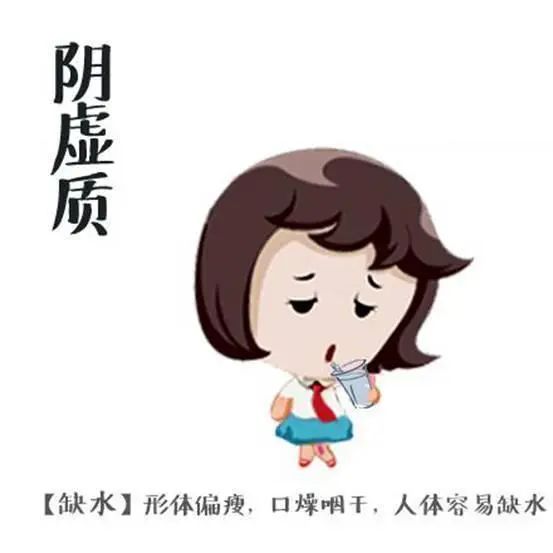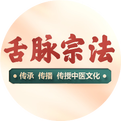|
> Follow Us < Inherit, disseminate, and teach high-quality content and classic cases on tongue diagnosis, pulse diagnosis, Traditional Chinese Medicine (TCM), herbs, and medical cases, providing more insights and assistance on the path of TCM syndrome differentiation and treatment. ⊙ Your friends might need to know this! Take a second to share it with your circle! Share health! |

“ Introduction:
Yin deficiency is a common pathological condition in TCM, referring to insufficient yin fluids that fail to nourish the skin, support the joints, and moisten the internal organs, leading to a series of symptoms. The causes of yin deficiency may include congenital weakness, irregular diet, emotional disturbances, etc., resulting in gradual depletion of yin fluids, or sudden loss due to febrile diseases, excessive sweating, or bleeding. Symptoms of yin deficiency include five hearts heat (palms and soles feeling hot), dry mouth and throat, dizziness and tinnitus, weakness in the lower back and knees, and in severe cases, may also present with night sweats, insomnia, and vivid dreams. Treatment methods primarily include nourishing yin and moistening dryness, nourishing the liver and kidneys, and replenishing blood, such as through herbal remedies, acupuncture, and tui na (Chinese therapeutic massage).”

01
—
Causes of Yin Deficiency
The causes of yin deficiency mainly include congenital weakness, irregular diet, and emotional disturbances.
1. Congenital Weakness
Congenital weakness primarily arises from inherent insufficiency, such as weak parental constitution, lack of proper care during pregnancy, or prolonged illness, leading to insufficient generation of yin fluids in the individual, making them prone to symptoms of yin deficiency. Patients of this type often exhibit signs of weakness, emaciation, cold extremities, restlessness, and night sweats from a young age, along with delayed growth and underdeveloped sexual organs. Treatment should focus on tonifying the kidneys and nourishing yin, utilizing herbal remedies and acupuncture.
2. Irregular Diet
Irregular diet refers to improper eating habits, such as excessive consumption of spicy or greasy foods, or overuse of warming herbs, which can damage yin fluids and lead to yin deficiency. Additionally, picky eating, excessive alcohol consumption, and binge eating can also deplete yin fluids, triggering yin deficiency. Patients often present with thirst, a preference for cold drinks, and dry stools. Treatment should focus on nourishing yin and moistening dryness, employing herbal remedies and dietary therapy.
3. Emotional Disturbances
Emotional disturbances refer to excessive worry or liver qi stagnation, which can lead to excessive liver fire, damaging yin fluids and resulting in yin deficiency. Patients often experience significant emotional fluctuations, insomnia, and palpitations. Treatment should focus on soothing the liver and relieving stagnation, using herbal remedies, acupuncture, and tui na.
Moreover, febrile diseases, excessive sweating, and bleeding can also lead to depletion of yin fluids, causing yin deficiency. For example, prolonged fever and sweating can consume yin fluids, leading to yin deficiency; excessive menstrual bleeding in women can also result in yin deficiency. These causes require targeted treatment based on specific conditions, focusing on nourishing and replenishing blood, and employing methods such as herbal remedies and dietary therapy.
In summary, the causes of yin deficiency are diverse and require treatment tailored to the specific condition. During treatment, it is essential to adjust diet, maintain a good routine, stabilize emotions, engage in appropriate exercise, and utilize herbal formulas, acupuncture, and tui na to effectively alleviate symptoms of yin deficiency and improve overall health. Additionally, preventing the occurrence of yin deficiency is crucial; avoiding excessive fatigue, maintaining a cheerful disposition, and eating a balanced diet are effective measures for prevention.
02
—
Symptoms of Yin Deficiency
The symptoms of yin deficiency are numerous, with the most common being five hearts heat, dry mouth and throat, dizziness and tinnitus, and weakness in the lower back and knees. The emergence of these symptoms is primarily due to insufficient yin fluids in the body, which fail to nourish the skin, joints, and internal organs, resulting in relative excess of yang energy and internal heat.
Specifically, five hearts heat refers to the sensation of heat in the palms and soles, restlessness, dry mouth and throat, and dry eyes. These symptoms arise because yin deficiency leads to a depletion of yin fluids, which cannot nourish the skin and oral cavity, resulting in relative excess of yang energy and internal heat. Additionally, due to the depletion of yin fluids, the metabolism of body fluids becomes imbalanced, leading to reduced saliva and causing dry mouth and throat, as well as dry eyes.
Dizziness and tinnitus are also common symptoms of yin deficiency, often described as a buzzing sound that varies in intensity. These symptoms occur mainly due to yin deficiency leading to liver and kidney yin deficiency, causing excessive liver yang, which affects the head and ears, resulting in dizziness and tinnitus. Furthermore, due to the depletion of yin fluids, the brain and marrow may not receive adequate nourishment, leading to headaches and insomnia with vivid dreams.
Weakness in the lower back and knees is another common symptom of yin deficiency, primarily manifesting as weakness and lack of strength in the lower back and knees, sometimes accompanied by pain. These symptoms arise because yin deficiency leads to liver and kidney yin deficiency, resulting in inadequate nourishment to the lower back and knees. Additionally, due to the depletion of yin fluids, qi and blood may not flow smoothly, leading to fatigue and numbness in the limbs.
In conclusion, the symptoms of yin deficiency are complex and varied, not limited to five hearts heat, dry mouth and throat, dizziness and tinnitus, and weakness in the lower back and knees, but also including night sweats, insomnia, and vivid dreams. The emergence of these symptoms is primarily due to insufficient yin fluids in the body, leading to relative excess of yang energy and internal heat, preventing adequate nourishment of the skin, joints, and internal organs. Therefore, in the prevention and treatment of yin deficiency, it is essential to focus on nourishing yin and moistening dryness, nourishing the liver and kidneys, and replenishing blood to achieve the goal of balancing yin and yang and harmonizing qi and blood.
03
—
Prevention and Treatment of Yin Deficiency
The prevention and treatment of yin deficiency require a multifaceted approach, including dietary adjustments, lifestyle changes, emotional stability, and the use of herbal treatments. Firstly, in terms of diet, one should choose light and cooling foods, such as mung beans, spinach, and cucumbers, to nourish yin and moisten dryness. It is advisable to avoid spicy and greasy foods that can exacerbate heat and harm yin. Secondly, maintaining a good routine is essential, ensuring adequate sleep and avoiding excessive fatigue to nourish yin and boost qi. Emotional stability is also important; avoiding excessive emotional fluctuations and maintaining a cheerful disposition can help reduce liver fire and prevent damage to yin fluids.
In terms of herbal treatment, it is necessary to differentiate and treat based on different causes and symptoms, employing various herbal formulas and acupuncture or tui na techniques. Here are some common patterns of yin deficiency and their corresponding herbal formulas:
-
**Lung Yin Deficiency**: Symptoms include dry cough, dry throat, coughing blood, afternoon fever, red tongue with little coating, etc. Treatment should utilize formulas that nourish yin and moisten the lungs, such as Sha Shen Mai Dong Tang (Glehnia and Ophiopogon Decoction), which includes Bei Sha Shen (Glehnia Root), Yu Zhu (Polygonatum), Sheng Gan Cao (Raw Licorice), and Mai Dong (Ophiopogon).
-
**Heart Yin Deficiency**: Symptoms include palpitations, insomnia, vivid dreams, irritability, dry mouth, red tongue with little coating, etc. Treatment should utilize formulas that nourish blood and replenish blood, such as Tian Wang Bu Xin Dan (Heavenly Emperor’s Heart-Supplementing Pill), which includes Sheng Di Huang (Rehmannia), Ren Shen (Ginseng), Fu Ling (Poria), Wu Wei Zi (Schisandra), and Dang Gui (Angelica).
-
**Kidney Yin Deficiency**: Symptoms include weakness in the lower back and knees, dizziness and tinnitus, night sweats, premature ejaculation, red tongue with little coating, etc. Treatment should utilize formulas that nourish the liver and kidneys, such as Liu Wei Di Huang Wan (Six-Ingredient Rehmannia Pill), which includes Shu Di Huang (Rehmannia), Shan Zhu Yu (Cornus), Shan Yao (Dioscorea), Ze Xie (Alisma), and Dan Pi (Moutan).
In addition to herbal formulas, acupuncture and tui na are also effective methods for treating yin deficiency. Acupuncture can regulate the flow of qi and blood in the body, achieving balance between yin and yang. Tui na can relax the meridians and promote the circulation of qi and blood, thereby nourishing yin and moistening dryness. Here are some commonly used acupuncture and tui na methods:
-
**Acupuncture**: Different acupuncture points can be used for different patterns of yin deficiency. For lung yin deficiency, points such as Tai Yuan (Taiyuan) and Fei Shu (Lung Shu) can be used. For heart yin deficiency, points such as Nei Guan (Neiguan) and Shen Men (Shenmen) can be used. For kidney yin deficiency, points such as Shen Shu (Shenshu) and Tai Xi (Taixi) can be used.
-
**Tui Na**: Tui na can relax the meridians and promote the circulation of qi and blood. Common tui na techniques include rubbing, patting, and kneading. During tui na, the pressure should be gentle yet firm, ensuring the patient feels comfortable.
Here is a typical case to illustrate the treatment methods for yin deficiency:
Mr. Li, 50 years old, has been working in sales for a long time. Recently, due to work stress, he developed symptoms of dry cough, dry throat, palpitations, and insomnia. The doctor diagnosed him with lung yin deficiency and treated him with Sha Shen Mai Dong Tang, along with acupuncture at Tai Yuan and Fei Shu points. After one week of treatment, the patient’s symptoms significantly improved. After two more weeks of treatment, the patient’s symptoms had largely disappeared, and he returned to a normal state of life.
In this case, the doctor tailored the treatment based on the patient’s symptoms and signs, using the nourishing lung formula Sha Shen Mai Dong Tang, combined with acupuncture treatment to regulate the flow of qi and blood, nourishing yin and moistening dryness. The patient experienced significant symptom relief and gradually returned to a normal state of life.
In summary, the prevention and treatment of yin deficiency require a multifaceted approach, including dietary adjustments, lifestyle changes, emotional stability, and the use of herbal treatments. Treatment should be tailored to the specific causes and symptoms, selecting appropriate herbal formulas and acupuncture or tui na methods. Additionally, attention should be paid to the dosage and administration of herbal medicines, as well as precautions and contraindications during the treatment process. Patients should follow medical advice for treatment and have regular follow-ups to adjust the treatment plan as needed.

